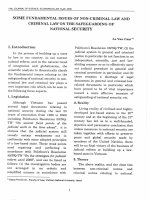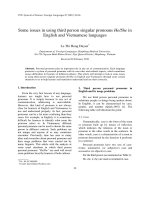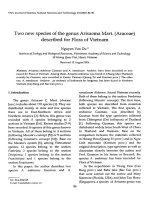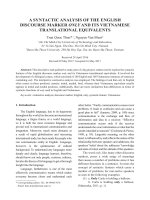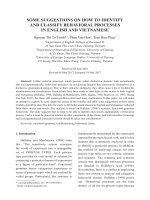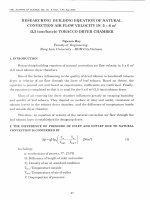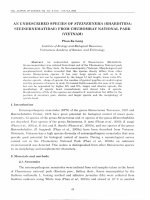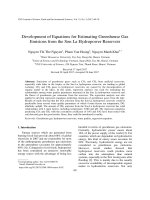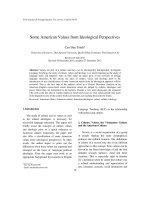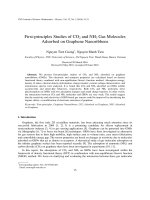DSpace at VNU: Some fundamental issues of Non-criminal law and criminal law on the safeguarding of national security
Bạn đang xem bản rút gọn của tài liệu. Xem và tải ngay bản đầy đủ của tài liệu tại đây (3.9 MB, 9 trang )
VNU.JOURNAL OF SCIENCE, ECONOMICS-LAW, Nq2E, 2006
SO M E FUNDAM ENTAL ISSU ES OF NON-CRIMINAL LAW AND
CRIMINAL LAW ON THE SAFEGUARDING OF
NATIONAL SEC URITY
Le V an C am 1’1
I. In tro d u ctio n
Politburo’s Resolution 08/NQ-TW; (2) the
judicial system in general and criminal
justice in particular do not function in an
independent, scientific, ju st and lawabiding m anner so as to effectively carry
out judicial procedure in general and
criminal procedure in particular; and (3)
there rem ains a shortage of legal
documents in general and criminal-lawrelated documents in particular which
have proved to be of vital im portance
toward a more effective m easure of
safeguarding of national security, etc.
In the process of building up a state
by law in our country, in our current
judicial reform, and in the n atu ral trend
of integration and globalization, the
scientific analysis to theoretically clarify
the fundam ental issues relating to the
safeguarding of national security in non
crim inal law and crim inal law plays a
very im portant role which can be seen in
the following three aspects.
1. L e g isla tio n
Although
V ietnam
has
passed
several legal docum ents relating to
national security during the last 20
years of renovation from 1986 to 2006
including Politburo’s Resolution 08/NQTW “On several focal points o f the
judicial work in the tim e ahead", it is
obvious th a t the judicial system still
reveals certain w eaknesses not in
conformity with some adopted principles
of a law-based state. These weak points
need repairing and perfecting in
accordance with Politburo’s Resolution
49/NQ-TW “On the strategies for judicial
reform until 202Ơ’, and can be listed as
follows: (1) the investigative bodies are
not arranged in an orderly and
simplified m anner in accordance with
2. R e a lity
Living reality of civilized and highlydeveloped law-based states in the 20th
century and a t the beginning of the 21st
century has led us to a well-founded,
objective and persuasive conclusion th a t
unless m easures to national security are
taken together with efforts to preserve
peace and global security made by
members of the U nited N ations, there
will be no final victory of the business of
judicial reform or building up a lawbased state in Vietnam.
3. T h eo ry
The above reality, and the close ties
between
non-crim inal
norm s
and
criminal norms relating to national
1’ Assoc.Prof.Dr.Sc., Faculty of Law, Vietnam National University, Hanoi
1
Le Van Cam
2
security have presented legal experts in
general and crim inal experts in
particular in Vietnam an im portant and
urgent task of searching for solutions not
only responsive to the urgent needs of
the society but also suitable to the
country’s socio-economy, politics, law,
culture, history, tradition, etc. So far,
there has been no research work in legal
publication in Vietnam focusing on
analyzing all basic features of non
criminal law and crim inal law over the
m atter of national security to help
gather scientific evidence for the process
of judicial reform until 2020 and the
building up of V ietnam as a law-based
state in a relatively system atic and
comprehensive m anner.
In short, the scientific analysis to
theoretically clarify the basic features of
non-criminal law and crim inal law over
the m atter of national security in the
three aspects above serves not only as
one of the basic directions for research in
legal sciences in general and criminal
sciences in particular in Vietnam, but
also as the factual foundations for
selecting issues discussed in this article.
Still, our discussion does not intend to
cover all legal issues in general and all
criminal issues in particular over the
m atter of national security because th a t
would be beyond the scope of an article
in a scientific periodical, and because
there are still controversies over these
issues, each of which can serve as a
separate topic for
research. We,
therefore, only intend to touch upon
several subjectively perceived common
and key issues.
II.
B a sic fea tu res o f n o n
crim in a l norm s co n cern in g
th e issu e o f n ation al se c u r ity
The
over the
Vietnam
from the
until now
study of non-criminal norms
issue of national security in
in different periods of tim e
August Revolution in 1945
reveals the following features:
1. F e a tu r e 1
The non-criminal norms relating to
the issue of national security is almost
always realized a t the constitutional
levels, and this can be seen in some
articles of the Constitutions of Vietnam
in the years 1959, 1980 and 1992 [6] as
follows:
1) The 1959 Constitution of the
Democratic
Republic
of
Vietnam
stipulates: “The State strictly forbids
and shall punish all acts against the
Vietnamese motherland, against the
democratic republic regime, and against
the national unity” (Article 7).
2) The 1980 Constitution of the
Socialist Republic of Vietnam stipulates:
“All m achinations and acts directed
against the independence, sovereignty,
unity, and territorial integrity of the
motherland,
against
the
socialist
revolution and construction of socialism,
shall be severely punished” (Article 13).
3) The 1992 Constitution of the
Socialist Republic of Vietnam stipulates:
“The Vietnam ese m otherland is sacred
VNU, Journal o f Science, Econom ics-Law, N ^ E , 2006
3
Som e fundamental issu es o f N on-crim inal law and..
and inviolable; All m achinations and
acts directed against the independence,
sovereignty,
unity,
and
territorial
integrity of the m otherland, against the
construction and defence of the socialist
Vietnamese
m otherland,
shall
be
severely punished in accordance with
the law” (Article 12).
2. F e a tu r e 2
Besides the above mentioned three
Constitutions - the state’s most powerful
and fundam ental laws, the second most
powerful legal document now in action
containing non-criminal norms adjusting
the safeguarding of national security in
overall m anner is the 2004 National
Security Law passed by the XI National
Assembly in its 6th meeting from October
23rd to December 3rd, 2004 [7] with 5
chapters further divided into 36 articles,
15 of which are about the safeguarding
of national security in 2 separate
chapters
being
chapter
II
“The
safeguarding o f national security"
(Articles 14 till 21), and chapter III
“Bodies in charge o f the safeguarding of
national security” (Article 22 till 28).
3. F e a tu r e 3
Non-criminal norms in the 2004
National Security Law acknowledge
fundam ental issues relating to the
safeguarding of national security such
as: (1) Legal term s: “national security”,
“safeguarding o f national security”, “acts
violating national security", “threat to
national security” (Article 3); (2) General
stipulation:
principles
to
the
VNU, Journal o f Science, Econom ics-Law, N,t2E, 2006
safeguarding of national security, setting
up of the guarding force for national
security, ensuring favourable conditions
for the safeguarding of national security,
international
cooperation
for
the
safeguarding of national
security,
policies dealing with violation of
national security, strictly forbidden acts
(Articles 5 - 8 and Articles 11 - 13), etc.
4. F e a tu r e 4
The non-criminal norms in the 2004
National Security Law stipulate the
most fundam ental m atters concerning
the safeguarding of national security
and bodies in charge of the issue in the
above mentioned chapters as follows: (1)
The task of safeguarding national
security (Article 14); (2) Key m easures in
safeguarding national security (Article
15); Rights and duties of the citizen in
ensuring national security (Article 17);
(4) Responsibility of organisations in
national security (Article 18); and (5)
System of bodies in charge of national
security and their tasks, rights and
duties as well as their persons in
charge’s rights and duties (Articles 22
till 25), etc.
5. F e a tu r e 5
A country’s safeguarding of national
security m ust include the task to fight
against crimes, especially organized
crimes and inter-continental crimes such
as terrorism , spying, illegal trading of
m ilitary weapons, transportation of
narcotics, smuggling, etc. However, non
criminal norms specified in the 2004
Le Van Cam
4
National Security Law do not include
this in the list of tasks concerning the
safeguarding of national security as
stipulated in Article 14, and it should
definitely be added.
III. F u n d a m en ta l fe a tu r es o f
crim in al n orm s co n ce rn in g
th e issu e o f n a tio n a l sec u r ity
The study of crim inal norms
concerning the issue of national security
in Vietnam, ones concerning different
levels of penal liability applied for
crimes infringing upon national security
during different periods of time from the
August Revolution in 1945 until now
shows the following features:
1. F e a tu re 1
During the period of 40 years (19451985) from the A ugust Revolution in
1945 to the first Penal Code in Vietnam,
the criminal norms concerning crimes
infringing upon national security were
found in 2 groups of legal documents
stipulating penal liability as follows:
Group 1 includes legal documents
directly concerning the fight against
crimes aimed a t endangering national
security such as: (a) Decree 128 dated
July 17th, 1950 stipulating “penalties for
illegal reading, stealing, discarding
official documents or letters” [3, tr.194];
(b) Decree 154 dated November 17th,
1950 stipulating “penalties for illegal
disclose office or government's secrets” [2,
p.303]; (c) Decree 133 dated November
20th, 1953 stipulating “penalties for
crimes infringing upon state's safetyy
internal and foreign affairs” [4, p. 16]; (d)
Decree 256 dated June 15th, 1956
stipulating “penalties for machinations
and acts directed to destroy properties of
the Statey co-operatives, people and to
impede the implementation o f the state's
policies and plans” [5, p .165]; and (e)
Ordinance dated July 30th, 1967
stipulating “penalties for crimes against
the country's revolution” [9, p .193], etc.
Group 2 includes criminal documents
not directly concerned w ith the fight
against crimes aimed a t endangering
national security, but concerning the
criminal sanctions for the violation of
forbidden acts such as: (a) Decree 6
dated September 5th, 1945 forbidding
“serving in unofficial m ilitary, and
supplying food for or cooperating with
the French imperialist” [1, p.5]; (b)
Decree 93 dated May 22nd, 1950
stipulating “the responsibility to carry
out o f a war o f resistance”[3, p .150]; (c)
Decree 69 dated October 12th, 1951
stipulating “the preserving o f the State's
secrets” [9, p. 133]; etc.
2. F e a tu r e 2
During the period of 14 years (19851999) from the first Penal Code in
Vietnam to the second Penal Code, the
crim inal norms concerning crimes
infringing upon national security were
acknowledged in a separate chapter in
the P a rt stipulating Crimes of 1985
Penal Code - chapter I: “Crimes
infringing upon national security” with
VNƯ, Journal o f Science, Economic S - L a w , N J E , 2006
5
Som e fundam ental issues o f N on-crim inal law and.
30 articles from Article 72 till 100. This
chapter stipulates “Especially serious
crimes infringing upon national security”
in Articles from 72 till 86 in Item A and
“Other crimes infringing upon national
security 9in Articles from 87 till 100.
3. F e a tu r e 3
From the second Penal Code in
Vietnam until now, criminal norms
concerning crimes infringing upon
national security are prescribed in a
separate chapter in the P a rt stipulating
Crimes of 1999 Penal Code - chapter XI:
“Crimes
infringing
upon
national
secu rity with 14 articles from Article 78
till Article 91.
4. F e a tu r e 4
Crim inal norms concerning crimes
infringing
upon
national
security
prescribed in the current 1999 Penal
Code in Vietnam are different from the
corresponding norms in the 1985 Penal
Code: (1) The 1999 Penal Code only
considers an act dangerous to the society
a crime infringing upon national security
if it fully consists of elem ents of such a
crime being the intention “against
people's power”; b) On the contrary,
C hapter I (14 articles from 87 to 100) of
the P art stipulating Crimes in the 1985
Penal
Code not
only prescribed
especially serious crimes infringing upon
national security in Item A, but also
considered some acts dangerous to the
society crimes infringing upon national
security even though they lack elements
VNU, Journal o f Science, Econom ics-Law, NJ.E, 2006
of such crimes in Item B “Other crimes
infringing upon national security
5. F e a tu r e 5
Nevertheless, the current legal
norms concerning crimes infringing upon
national security in our 1999 Penal Code
still reveal some shortcomings as
follows:
(1) There has been no clarity in
specifying the
object entitled to
protection of the criminal law in Article
78 “High treason” m eaning an act of
betraying the country while this crime
only concerns the betrayal of the State.
It is, therefore, recommended th a t the
broad-m eaning and
abstract term
“country” be replaced by the term “State”
as used by President Ho Chi Minh in
Article 50 of the 1946 Constitution.
(2) There has been no clarity in
specifying w hat is really going on in the
acts considered crimes prescribes in
articles from 86 till 88 because the
stipulation in these articles only reflects
a person’s points of view with such term s
as “underm ining the implementation
of...” (Article 86), “sowing division”,
“sowing
h a tred ’
(Article
87),
“propagating against, distorting’ (Article
88), etc. These term s are not only
inappropriate scientifically but also not
in accordance with reality, especially
th a t in prosecution or trial where it is
very difficult to combat crimes if
crim inal acts are so vaguely stipulated.
6
Le Van Cam
rv.
C onnotation, co n cep t and
(3)
Therefore, to make good these
k ey
featu res
of
th e
shortcomings when stipulating the acts
safegu ard in g
of
n ation al
satisfying signs for determ ining crimes
secu rity
p rescrib ed
by
infringing upon national security in
crim in al law - th e th ree key
particular and all kinds of crimes
factors th a t n eed th eo retica l
prescribed in the specific p art of the
cla rifica tio n
Penal Code in general, it is necessary to
stipulate specific crimes as acts th a t can
1. C o n n o ta tio n o f th e sa fe g u a rd in g
o f n a tio n a l s e c u rity p re s c rib e d by
be committed, not as abstract and vague
c rim in a l law
concepts th a t can be understood and
treated in different ways. For example,
the crimes prescribed in Article 88 of the
1999 Penal Code can be stipulated in a
more specific way, and should be
renam ed “Conducting public call to
change the constitutional regime o f the
Socialist Republic o f V i e t n a m Taking
over S. M ontekia’s progressive outlook
th at the law should punish people’s
wrong doings only, criticizing the
punishm ent ju st to show political or
religious beliefs, and supporting the
view th a t intelligent law m akers should
only attribute legal responsibilities to
specific acts performed in reality, the
great ju rist Karl Max, the founder of
scientific socialism, wrote “A ny code
against
natural
tendency
without
introducing objective criteria is a terror
c o d e Obviously, any code whose
fundam ental criteria do not base on
hum an’s behaviours but on hum an’s
thinking is “a true reflection o f a chaotic
society [8] as “nobody should be
imprisoned because o f his conduct,
political opinion or religious b e lie f [8].
In the construction of a law-based
state in Vietnam, the safeguarding of
national security stipulated in criminal
norms has proved its importance in the
two fields of internal affairs and foreign
affairs security as follows:
1) In tern a l affairs
The treating of national security as a
special object to be protected by criminal
law from the infringem ent of crimes will
play a decisive part in stabilizing a
country’s socio-politics so th a t its people
can enjoy happiness and stay away from
all kinds of civil conflicts or wars
because national security of a state
reflects the stability of its constitutional
regime, the existence and solidity of its
political system and apparatus of
government from the centre to localities,
the inviolability of its independence,
sovereignty and territorial integrity in
accordance with a certain legal order.
2) Foreign affairs
If a country's national security is
effectively protected from the th reat of
crimes coming from abroad infringing
VNU, Journal o f Science, Economics-Law, N^2E, 2006
7
Som e fundamental issues o f N on-crim inal law and..
upon peace and hum an kind, it will be of
great help to raise the country’s prestige
in the global community and in
m aintaining a foreign policy of peace,
friendship and cooperation with the world.
2. T he c o n c e p t o f s a fe g u a rd in g of
n a tio n a l s e c u rity p re s c r ib e d by
c rim in a l law
Although the concept has never been
recorded in any laws and is still in the
drafting process to be realized in
criminal science, we can base on the
above analysis of the issue to propose a
definition of the concept under study as
follows: The safeguarding o f a country's
national security prescribed by criminal
law as a special object is the construction
o f particular crimes corresponding to
acts considered dangerous to society
infringing upon social relations
to
m aintain
the
stability
of
the
constitutional regime, the development,
existence or solidity o f its political system
and apparatus o f government from the
centre to localities, the inviolability o f its
independence, sovereignty and territorial
integrity in accordance with a certain
legal order. It is also the stipulation of
corresponding coercive measures in
criminal law, and the application of
these measures in reality to prevent and
combat the above mentioned crimes.
3.
F u n d a m e n ta l f e a tu re s o f th e
s a fe g u a rd in g o f n a tio n a l s e c u rity
p re s c rib e d by c rim in a l law
From the scientific analysis of the
concept’s connotation, based on legal
VNU, Journal o f Science, Econom ic S-Law, NJ2E, 2006
norms concerning crimes infringing upon
national security recorded in criminal
law of Vietnam, and according to the
study of the prevention and combat of
this kind of crimes in reality (especially
during the application of the criminal
norms to reality), we can point out the
following fundam ental features of the
safeguarding
of national
security
prescribed by criminal law:
1) F eature 1
The safeguarding of national security
as a special object prescribed by criminal
law is the scientific construction in law
(especially in the particular p art of the
Penal Code) of particular crimes
corresponding
to
acts
considered
dangerous to society infringing upon
social relations to m aintain the stability
of the constitutional regime, the
development, existence or solidity of its
political system and apparatus of the
governm ent from the centre to the
localities, the inviolability of its
independence,
sovereignty
and
territorial integrity in accordance with a
certain legal order.
2) F eature 2
The safeguarding of national security
as an especially im portant object in the
system of objects protected by criminal
law is the appropriate stipulation in law
(especially in the particular p art of the
Penal Code) of corresponding coercive
m easures in crim inal law applicable to
acts considered dangerous to society
infringing upon the mentioned relations.
Le Yarn Cam
8
3) Feature 3
The safeguarding of national security
prescribed by crim inal law is the
application of coercive m easures in
criminal law in the process of prevention
and combat of crimes infringing upon
national security with an aim to
m aintain
the
stability
of
the
constitutional regime, the development,
existence or solidity of its political
system and apparatus of government
from the centre to the localities, the
inviolability
of
its
independence,
sovereignty and territorial integrity.
4) ử e a tu re 4
The safeguarding of national security
prescribed by crim inal law is the precise
specification of components making up
crimes committed in violation of national
security
and
the
application
in
accordance
w ith
the
law
of
corresponding coercive m easures in
criminal law to offenders with an aim to
promote preventive functions both
publicly and privately, and to reach the
purpose of the penalty declared in the
verdict and the judgem ent.
5) Feature 5
A country’s safeguarding of national
security prescribed by crim inal law only
proves effective
if the
country’s
authorities strictly observe laws and the
legal system, respect and protect
democratic values and the rights and
freedom of people in general and of the
country’s citizens in particular, and
show goodwill toward the cooperation
with other countries in the region and all
over the world in the safeguarding of
national security which is also of world
peace and security.
V. C on clu sion
Based on the study
common and fundam ental
criminal and criminal
safeguarding of national
now conclude on the
theoretical points:
of the most
issues in non
law on the
security, we
following 5
1. F irst, if national security is seen in
the light of general law as the stability of
the constitutional regime, the existence
or solidity of its political system and
apparatus of government from the centre
to the localities, the inviolability of its
independence,
sovereignty
and
territorial integrity in accordance with a
certain legal order, it is, in the light of
criminal law, the kind of object under
special protection by crim inal sanctions
from the infringem ent of crimes.
2. Second, if national security is
effectively
protected
from
the
infringem ent of crimes by criminal
sanctions, this will have a very
im portant meaning to a country’s
security of internal affairs and foreign
affairs as well as to the preservation of
world peace and security of hum an kind.
3. T hird, in order to defend national
security using crim inal law, law m akers
should build up, in a scientific m anner,
specific definitions of crimes infringing
VNU, Journal o f Science, Econom ics-Law, N ^ E , 2006
9
Some fundam ental issues o f N on-crim inal law and..
upon corresponding social relations to
m aintain
the
stability
of
the
constitutional regime, the development,
existence or solidity of its political
system and ap p aratu s of government
from the centre to the localities, the
inviolability
of
its
independence,
sovereignty and territo rial integrity in
accordance with a certain legal order.
Furtherm ore,
law m akers
should
prescribe appropriate and feasible
coercive m easures in criminal law so
th a t they can be applied in preventing
and combating crim es infringing upon
national security.
determ ine the right crimes and apply
the right coercive m easures so th at a
ju st, reasonable and law-abiding penalty
can result.
5.
Fifth, a country’s safeguarding of
national security using criminal law’s
stipulation can prove effective only when
there exist strict and clear stipulation of
the country’s criminal law (Law of
Content) and crim inal procedure law
(Law of Form), actual respect and
protection of hum an and citizen’s right
and freedom as the noble social values in
hum an
civilization, mechanism to
guarantee the effective cooperation of
4.
Fourth, one of the essential courts and bodies competent to protect
conditions to help improve the efficiency
law s w ithin a country and all over the
of the safeguarding of national security
globe in a joint-task of protecting
using crim inal law ’s stipulation is th at
international security from crimes
the bodies and persons competent to
infringing upon world peace and
conduct procedural activities have to
security.
REFERENCES
1.
2.
Công báo nước Việt Nam Dân chủ Cộng hòa, 1945, sô' 1.
Công báo nước Việt Nam Dân chủ Cộng hòa, 1950, sô' 13.
3.
4.
Công báo nước Việt Nam Dân chủ Cộng hòa, 1950, sô' 6.
Công báo nước Việt Nam Dân chủ Cộng hòa, 1953, sô' 3.
5.
Công báo nước Việt Nam Dân chủ Cộng hòa, 1956, số 17.
6.
Hiến pháp Việt N am (năm 1946, 1959, 1980, 1992 và Nghị quyết về việc sửa đổi, bổ
sung một sô'Điều của Hiến pháp năm 1992), NXB Chính trị Quốc gia, Hà Nội 2002
tr.30, 71, 126-127.
7.
Luật an ninh quôíc gia, NXB Chính trị Quốc gia, Hà Nội, 2006.
8.
Mác c. và Ảnghen Ph, Toàn tập, Tập 1, NXB Sách chính trị Quốc gia, Maxcơva,
tr.14 và 182 (Tiếng Nga).
9.
1956
Tập hệ thôhg hóa luật lệ về hình sự, Tập I (1945 - 1974), TANDTC xuất bản, Hà Nội 1975.
VNU, Journal o f Science, Econom ics-Law, N„2E, 2006
